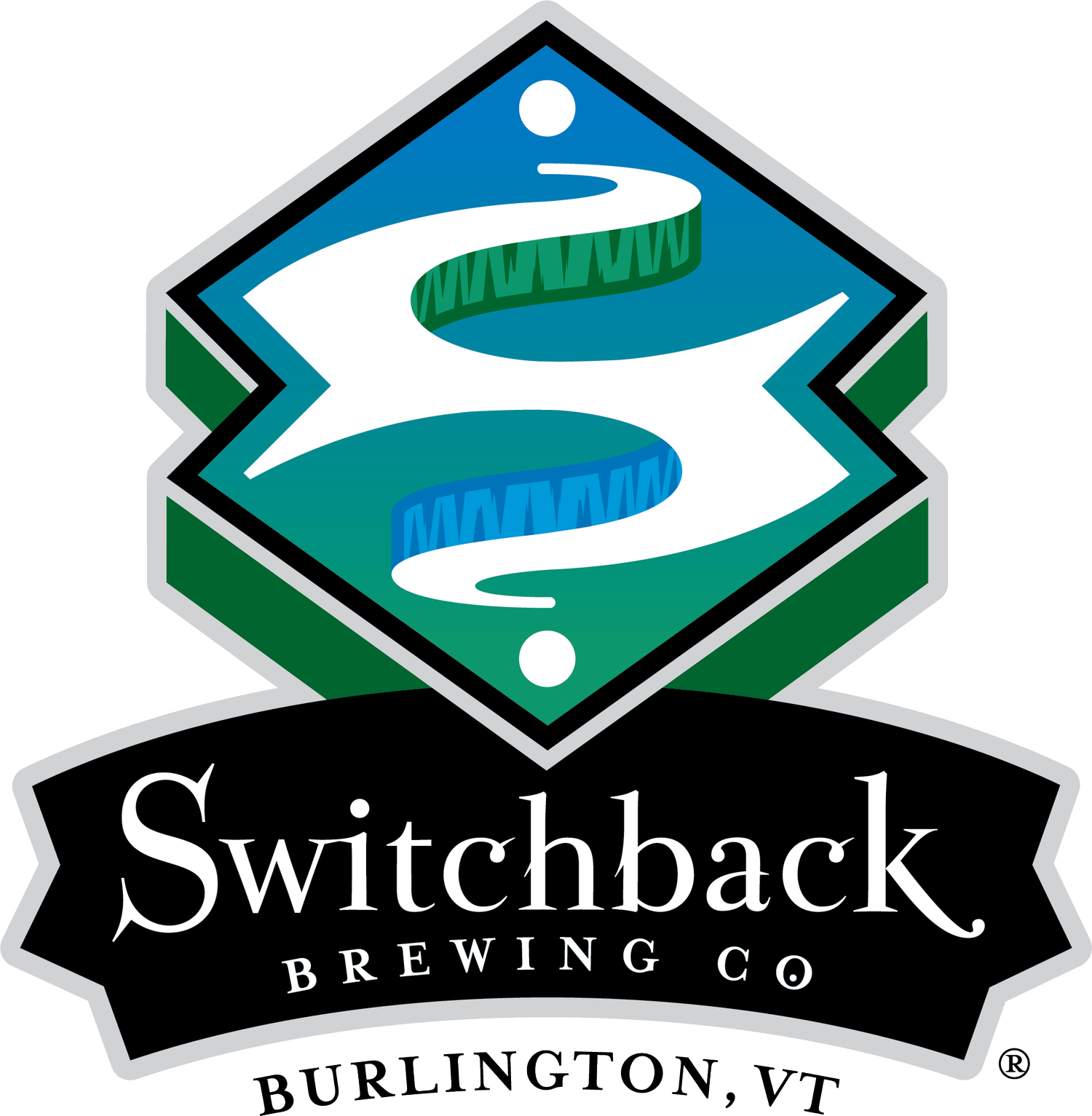Switchback Brewing Joins the Growing Nonalcoholic Beer World
I don't have a hard rule about drinking on the job — after all, it's a food writer's obligation to taste everything. Still, I don't often sip a beer while I'm interviewing someone.
It was a different situation when managing partner Josh Weber cracked open a classic blue can at Switchback's Beer Garden & Tap House a couple of weeks ago. Sure, it's a brewery, and we were talking about beer. But the ale he poured was booze-free.
The employee-owned brewery in Burlington's South End released its first nonalcoholic beer — made with the same recipe as its flagship Switchback Ale — on February 28. With Switchback N.A., the company joined an exploding market across the country, but one that Vermont's small breweries have been slow to enter due to the cost and logistics of production. As many Vermonters consider the health implications of booze and move toward drinking less (or not at all), Switchback has found an unusual way to hop on the temperance trend — one that actually tastes good.
Nonalcoholic beer isn't new — O'Doul's has been around since 1990 — but it long had a reputation for being kinda gross, and it was a macrobrewery's game. Today, most major beer companies have an offering under the 0.5 percent alcohol threshold that's considered "nonalcoholic" in the U.S., including Budweiser Zero, Corona Non-Alcoholic and Guinness 0.
But Connecticut's Athletic Brewing, which launched in 2017, has done a better job of pouring what Vermonters typically drink, with its N.A. IPAs and other styles that reflect the variety available at local microbreweries.
"The craft beer movement was really at its height, and Athletic latched on to that," said Marc Gelsomino, beer and wine manager at Winooski's Beverage Warehouse.
Nonalcoholic beverages as a whole are "one of the only categories still seeing steady growth," he said, though "it's pretty straightforward to show growth from zero." He expects sales might plateau in a year or two.
Beverage Warehouse's best-selling nonalcoholic beer is Athletic's Run Wild flagship IPA, which in the past year has sold a little more than 400 cases (both six- and 12-packs), Gelsomino said. In comparison, the Bevvie's most popular beer, the Alchemist's Heady Topper, sold just under 1,000 cases, he added.
In a fiercely local beer market, it might seem weird that a Connecticut biz comes out on top for nonalcoholic options. But Rescue Club Brewing has been the only non-alc beer brand from a Vermont brewery since its launch by Burlington's Zero Gravity Craft Brewery in January 2021, Gelsomino said — though beer-adjacent alternatives such as hop water (a hops-infused seltzer) are more plentiful.
Unlike regular breweries, where the grain-to-glass process and shiny equipment are often on display and touted on tours, nonalcoholic beer producers tend to shroud their work in mystery. Phrases such as "proprietary technique" and "no one else in the whole world knows" dot the Rescue Club website, for example.
Finding the right process is part of what took the Switchback team so long to launch its nonalcoholic beer, cofounder and president Bill Cherry said. He spent the past five years digging into it.
Most nonalcoholic beer on the market is made in one of three ways, Cherry explained: by not producing any alcohol in the first place, by distilling out the alcohol, or by pushing out the alcohol through reverse osmosis. Each option has its flaws.
The first — which Athletic uses, Cherry said — leaves residual sugar that preserves flavor but prevents the product from being totally crisp and clean. With the second method, the heating required for distillation zaps that flavor. The third approach, reverse osmosis, is a cold process, but it can thin the beer.
The last two options require specialized equipment, and whichever process a brewery chooses, it needs a pasteurizer, too. (Alcohol is a preservative; without it, brews need to be pasteurized to be shelf-stable.)
"To do it the way I would insist on doing it, you're investing huge amounts of money on something that you have no idea if anybody's interested in," Cherry said.
When he tasted the nonalcoholic version of Black Butte Porter from Bend, Ore.'s Deschutes Brewing at a conference last year, he finally found something that met his standards. He also met the folks at Sustainable Beverage Technologies, whose BrewVo NA process is used to create the N.A. porter.
The Colorado company's "nested fermentation" technology is as proprietary as it gets. Cherry has signed a nondisclosure agreement and declined to explain its details, other than that it starts with reverse osmosis but "accommodates the negatives" with a "magic part" that reintroduces beer character that's usually stripped out.
Rather than just selling its BrewVo NA technology — which would come with a multimillion-dollar price tag — Sustainable Beverage set up a program that allows small breweries to use its facilities to develop and produce their products. Cherry flew out to its Colorado headquarters to oversee a test batch, working with its team to make small technical adjustments to the recipe, which is identical to Switchback Ale's never-before-shared recipe, down to the yeast.
"The process is still craft," Cherry said.
As Deschutes did, the Switchback team opted to make a nonalcoholic version of a beloved staple, rather than creating something new for the N.A. market. Unfortunately, the only place on the East Coast that has a BrewVo NA setup for contract brewing is in Toronto. Switchback completed its first batch there under the wire, but it has a yearlong contract to produce nonalcoholic beer over the border, and the team is worried about tariffs, Cherry said.
"Right now, to get what we want, this is the only way to get it," he said. If the demand is there, he added, he's ready to make that multimillion-dollar investment for a BrewVo setup at Switchback.
click to enlarge
File: Daria Bishop
Josh Weber at Switchback's Beer Garden & Tap House
So far, so good. Since its late-February release, Switchback N.A. has become the second-best-selling to-go beer at the brewery's Flynn Avenue Beer Garden & Tap House, Weber said. It sold 85 six-packs in March.
"As soon as we announced it online, people started emailing and calling to see where they could get it," marketing manager Abbe Carroll said.
Calling isn't entirely necessary: The brewery has a handy beer finder on its website now, unlike when it first launched bottles to much excitement in 2012.
Still, "it's feeling like the old times of Switchback," said Amy Lieblein, who works in marketing and events for the brewery.
"It feels like the craft beer market in the '90s," Cherry added. "You know when you put your product out, N.A. drinkers are going to try it. They walk up and say, 'There's a new one!'"
Sipping it at the Beer Garden, I immediately got the hype. It tasted like Switchback — a beer for which I have a strong nostalgic fondness, as someone who started drinking in Burlington basements almost 20 years ago. A keg of Switchback was a sign of a fancy party, and it's what we ordered at restaurants when we were feeling particularly adult.
My cohort is now the target audience for Switchback N.A. I started drinking nonalcoholic beer when I was pregnant two years ago, pouring it into a glass when I was still hiding the news, then simply enjoying the communal act of sipping a beer at a party without the resulting buzz. I've continued drinking N.A. beers since then. Hangovers aren't ever fun, but they're especially brutal when you're awoken at 6 a.m. by a toddler screaming "BUS!" and demanding four different types of breakfast.
If I'm going to have a couple of drinks, I take the "zebra striping" approach, as coined in the UK: one boozy, one not, repeat. I'm not the only one following that strategy in my thirtysomething friend group. During a recent catch-up with a Brooklyn friend, she told me she'd gone out for drinks the night before: a gin martini, then an Athletic.
Similarly, for Switchback's nonalcoholic release, "The timing just made sense for the brewery," Lieblein said. "We ourselves have grown up, and we're trying to find more balance in our own lives." Several staffers no longer drink, she added, and it's been nice to have an option for them.
"Everyone has different reasons" for choosing Switchback N.A., Carroll said, noting that its customers are a 50-50 split of men and women, as well as a range of ages.
There's no law in Vermont dictating an age minimum for who can buy nonalcoholic beer — it's one of a handful of states that leaves it up to businesses, and there's no federal law. Switchback has decided to keep its N.A. "an adult beverage," Carroll said. The brewery will only sell it to ages 21 and up.
Beverage Warehouse, which doesn't have an age minimum for nonalcoholic beer, sold 12 cases of Switchback N.A. in the first month and a half it was available ($10.99 for a six-pack), according to Gelsomino.
"It's still early, but that's a pretty strong number," Gelsomino said. "We've had people call and ask for it, and we've had repeat buyers already."
He credits the brewery's strong reputation in the local market — it was long the top-selling draft beer at restaurants and bars, he said — and the fact that its unfiltered ale is "a little different" from other nonalcoholic beers, with more hoppiness and depth.
After my chat with the Switchback team at the Beer Garden, I left with a six-pack — and a 22-ounce bottle of Switchback Ale, for comparison. When I split a glass of each with my husband while watching a Champions League soccer game, the differences were a little easier to spot. Switchback N.A. had a floral aroma that gave it away. It was a good dupe, but side by side, it lacked a bit of the OG's finishing punch.
Identical or not, it tastes good. If you're not a fan of bitterness, you might even prefer the lighter finish. As we watched Arsenal batter Real Madrid, I found myself reaching for the nonalcoholic glass. The 3-0 score already had me buzzing.”


